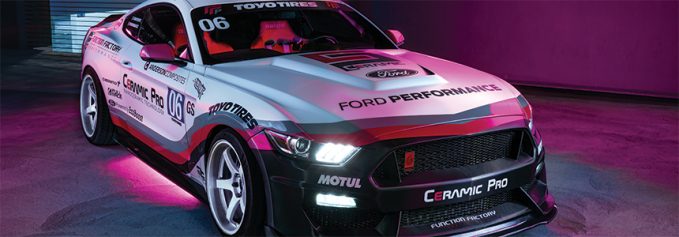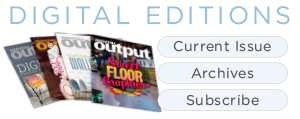
By Olivia Cahoon
Labels, stickers, and decals are produced on both narrow and wide format digital devices. Wide format is typically used for short-run stickers and decals while narrow format machines—usually around the 13-inch print width mark—offer a more traditional approach for longer press runs.
Digitally printed labels gain ground with features that enable personalization and economical short runs. Print service providers (PSPs) looking to add a new revenue stream may want to consider investing in printing and finishing equipment that supports digital label production.
Above: Wrapsesh is a wrap printing company and installer in Mesa, AZ that works with a Mutoh ValueJet 1624X printer and Mutoh ValueCut 1800 plotter to create vehicle decals.
Promotional Products Demand Labels
In 1989, SnugZ USA started with three people in a residential home in Salt Lake City, UT. It originally produced customizable eye glass retainers that allowed users to hang glasses around their neck.
Now, SnugZ USA has multiple product lines including candles, lanyards, leather journals, lip balm, puzzle cubes, stickers, and sunscreen—totaling over 1,200 products, most of which are used for the promotional products industry in UT. Servicing Canada and the U.S., the company employs over 600 people.
“We are fortunate enough to have grown consistently throughout the years due to our quality and service,” shares Darren Massey, director of manufacturing, SnugZ USA.
Currently, the shop operates in a 130,000 square foot building built in 2014. At the time, the company assumed this was enough space, however, with recent growth, Massey says the building quickly filled much faster than anticipated. “All good things, of course.”
Of its 1,200 products, SnugZ USA produces pressure-sensitive labels, which mostly consist of company logos. The labels are applied to several products, including lip balm, lotion, sanitizer, and sunscreen—totaling about 33 percent of the shop’s entire business.
SnugZ USA has three Epson digital label presses—two SurePress L-4033AW devices and one SurePress L-4533AW. It uses Wasatch Computer Technology RIP software to drive production and the Epson SurePress seven-color ink set, which includes white, orange, and green. “The ultra-wide color gamut allows us to deliver a remarkable range of outstanding colors for our customers,” shares Massey.
SnugZ USA purchased its label presses several years ago after deciding it needed to incorporate new technologies for label printing in order to keep up with the digital age. “We were mostly concerned about the quality of labels, short runs, and uptime of the press,” says Massey. “But, with the Epson SurePress digital label presses, we haven’t had any issues.”
Small Beginnings
SnugZ USA started digitally printing in 2007 after the owner, Brandon Mackay, wanted to produce lip balm labels, but had a hard time deciding how to decorate.
According to Massey, the first year transitioning to digital was interesting due to quality and lack of repeatability. “Several companies were trying to make digital printers for short-run labels, and only some succeeded,” he admits. “In short, we moved to digital printing to fill a need for short-run labels.”
Today, the majority of SnugZ USA’s label customers are distributors that sell into the promotional products industry. Because the PSP mostly deals with company logos, which represent brand image, it’s crucial that colors and graphics are exact. “We understand that companies have worked hard to create an image that is representative of the brand,” shares Massey.
SnugZ USA’s labels often require fast turnaround, typically within 48 hours. Therefore, Massey says the shop must use a reliable digital printer to avoid unexpected challenges. Using both the Epson SurePress L-4033AW and SurePress L-4533AW, SnugZ USA’s run sizes range from 50 to 100,000 pieces, with an average of 450 labels.
Aside from label production, the PSP also offers direct printing on a Roland DGA Corporation VersaUV LEF-300, epoxy stickers on an Epson SureColor S40600, and dye-sublimation on four Epson SureColor F9370 printers.
From Wraps to Decals
Established in 2016, Wrapsesh is a wrap printer and installer in Mesa, AZ. The company started with two people completing motorcycle wraps in a dining room.
Eventually, owners Michael Shedd and Jessica Bonifacio went mobile for other shops and companies, building a reputation and clientele. It originally specialized in color changes and accent work. Shedd had five years’ experience in the wrap industry and was regarded as a quality installer.
Over the past three years of business, the shop moved four times. Today, it employs a team of six—three installers, an assistant, cameraman, and worker. As its reputation for custom and luxury wraps grows, so does customer demand.
“We began reaching out and networking with designers, printers, and other businesses that offered services that could benefit our business,” shares Jessica Bonifacio, owner, Wrapsesh. “We are all about collaboration, not competition.”
Wrapsesh works with international clients and different designers for custom printed wraps as well as decals.
In 2019, the shop partnered with FELLERS and Mutoh America, Inc., acquiring a Mutoh ValueJet 1624X printer—establishing Wrapsesh as a full-service graphics shop. The PSP now offers color changes, custom designs, printed graphics, ceramic coatings, window and taillight tint, detailing, powder coat services, paint-less dent repair, and clear protective films. It also specializes in live demonstrations and regularly makes appearances at various trade shows.
The ValueJet 1624X press is Wrapsesh’s first printer. “We have so many custom graphics requests now, we wanted to be able to offer the services in house to be in more control of the project,” shares Bonifacio.
In addition to its press and laminator, the shop also uses a Mutoh ValueCut 1800 plotter, allowing Wrapsesh to offer full graphics services from vinyl prints and banners to foam boards, textiles, and cut graphics.
The ValueCut 1800 plotter is ideal for both home and professional use. It features a maximum cutting width of 72 inches and comes standard with a roll support system for easy handling and multi-segment registration.
According to Bonifacio, the shop selected Mutoh for its precision, color quality, and top-notch equipment. “More than anything though, we love them because of their amazing service,” she shares. Mutoh offers onsite maintenance and equipment setup aid.
Vehicle Decals
Wrapsesh uses its Mutoh press and plotter to produce vehicle decals. Its business appeals more to personal vehicles for customers rather than commercial clients. While the company doesn’t produce a large amount of wholesale labels, it does offer decals and labels as an added service or custom order. “We would love to find a good balance between offering commercial and luxury services,” admits Bonifacio.
With its Mutoh equipment, the company also works within the industry by producing decals and graphics for other shops or installers that don’t have a printer or plotter.
The Mutoh ValueJet 1624X, also known as the Wrapper’s Choice, is an ideal digital printing solution for Wrapsesh. It prints up to 600 square feet per hour (sf/h) and includes Mutoh Smart Printing Technology like DropMaster ink technology for dot placement accuracy.
Wrapsesh’s smallest available decal size is 2×2 inches, although the shop can offer down to one-inch if needed. “When it comes down to our plotter, the smallest size text I am comfortable cutting is around one-fourth of an inch. Anything smaller than that can get really hard to weed out or cut cleanly,” admits Bonifacio. Sizing also depends on the material used.
Regardless, Bonifacio says the Mutoh equipment is fantastic for both small custom orders and large format or bulk orders. With the Mutoh plotter, Wrapsesh can run an entire 25-yard roll of film for decals without problem.
Stickers for Anything
Stickers For Days is a local sticker factory that started in May 2017 in Bellingham, WA. The company prints swag stickers, production labels, small signage, storefront signs, vehicles graphics, and digital designs from a 1,200 square foot facility.
Using a Roland TrueVIS VG-540 printer/cutter and a 54-inch Roland CAMM-1 GR-540 large format cutter, Stickers For Days’ clients range from local breweries to large establishments like Western Washington University and the City of Bellingham.
Currently, labels are 30 percent of the shop’s business. “We make them for coffee companies, but the options are endless,” say Andrew Howard and Carlos Olvera, owners, Stickers For Days. “We can cut the labels into stripes or apply them to a core if someone needs a continuous roll.”
Stickers For Days selected the Roland devices after seeing both machines in action at an event. According to the owners, they were immediately amazed by the quality and simplicity of the software, which they believe is a bigger win than most think.
The TrueVIS VG-540 is equipped with four Roland FlexFire printheads that deliver precision droplet placement in three sizes. The press has a production speed of 107.6 sf/h in high-quality mode.
“Using a digital printer has definitely changed the game compared to even ten years ago when this type of machinery was not even user-friendly yet,” share Howard and Olvera.
The TrueVIS VG-540 uses seven colors including CMYK, light magenta, light gray, and light cyan. The majority of the PSP’s preferred media is 3M Commercial Solutions, Arlon Graphics, LLC, and General Formulations. “These materials are used to produce anything from simple labels to high-end vehicle graphics that go around curves and are meant to withstand outside affliction,” offer Howard and Olvera.
With its devices, Stickers For Days prints anything imaginable—from swag stickers, a-frames, and coroplast real estate signs to wide format artwork, banners, and full vehicle graphics. Most of its customers use their labels to apply to products like herbal jars, tubes, and hot sauces.
Stickers For Days has a $60 print minimum. Its most popular label sizes range from 1×3 to 2×5 inches. Pricing depends on quantity and material type.
By using a digital-only production process, the shop experiences exceptional benefits, especially for short runs. “When a client needs a small custom batch, we don’t need to produce thousands of pieces of a single-color plate that can take weeks to produce,” explain Howard and Olvera. “With our software we can print what you see on screen and plot any shape that you want at any quantity. That is what makes digital better.”
Increasing Opportunity
Digital label printing equipment is available in many forms from narrow format dedicated systems to wide format printers and cutters. Adding labels, stickers, or even decals to a printing environment enables PSPs to effectively handle short-run demands.
Nov2019, Digital Output


